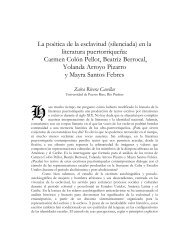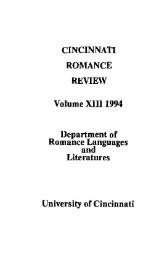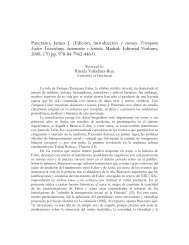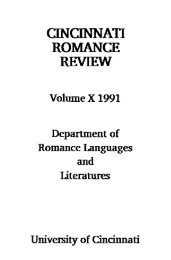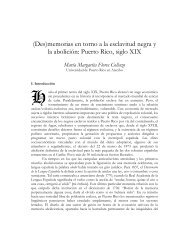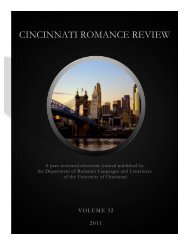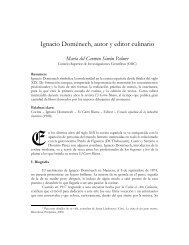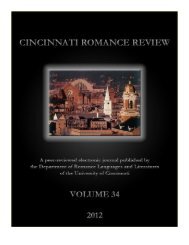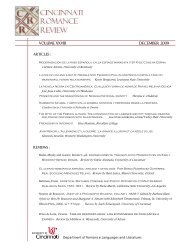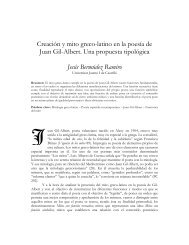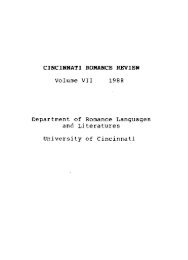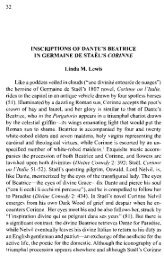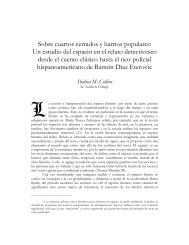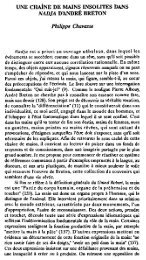Volume 30 (2011) - Cincinnati Romance Review
Volume 30 (2011) - Cincinnati Romance Review
Volume 30 (2011) - Cincinnati Romance Review
Create successful ePaper yourself
Turn your PDF publications into a flip-book with our unique Google optimized e-Paper software.
“THE EROTIC AS POWER” 95<br />
matrix of race, sex, and power. Doña Georgina insults Marina calling her, “¡Mala mujer,<br />
indecente, negra apestosa, apestosa!” (Santos-Febres 48). These affronts are loaded<br />
with several layers of cultural significations connected with the black and white<br />
women’s bodies. The use of the phrase “mala mujer, indecente” associated with the<br />
black body immediately evokes its sometimes invisible opposite, “buena mujer,<br />
decente.” It is the latter that establishes notions of not only the culturally appropriate<br />
behavior expected of the idealized Puerto Rican femininity, but also dictates who is<br />
permitted to expresses these notions and who is allowed to police them and how. With<br />
the two women, one white and the other Afro-descendant, present in this scene, Doña<br />
Georgina views herself has the “buena mujer, decente” but also feels she has a public<br />
reputation to protect as an upholder of white, middle-class values. Marina’s public<br />
affection and display of sexuality towards the dark-skinned Eladio “reflects” poorly on<br />
Doña Georgina’s desire to maintain a certain public image of control of her household.<br />
As the opposite of Doña Georgina’s whiteness, class position, repressed sexuality, and<br />
proximity to the idealized femininity, Marina is the “mala mujer, indecente” – black,<br />
poor, and “sexual.” When Doña Georgina links “negra apestosa” she is evoking a long<br />
held and widely circulated stereotype that the black body “stinks” – it is defective,<br />
infirm, diseased, undesirable. She repeats “apestosa” to emphasize her displeasure,<br />
which also underscores the historical tension between women of the Creole elite and<br />
the black and mulatto women over power, place, and privilege.<br />
Doña Georgina keeps a vigilant eye on Marina, restricting her exit from the<br />
house and her communication with Eladio. As a woman in erotic self-connection with<br />
her body and her feelings, Marina’s cooking becomes insipid because of her depressed<br />
emotional state, which prompts even more insults from her patrona. Marina’s desire for<br />
Eladio grows and she summons him to the Velazquez house with her fragrance, but<br />
their encounter is cut short by Hipólito’s insults. In an effort to blackmail Marina,<br />
Hipolito proposes to Marina that he will not tell his mother about Eladio’s unapproved<br />
visit if she will let him suck her breasts. For Marina, this perverse request is the last<br />
straw. She becomes uncontrollably angry and the rancor in her body begins to produce<br />
rancid smells: “Por todos los poros se le salió un olor herrumbroso mezclado con peste<br />
a aceite quemado y ácido de limpiar turbinas. Era tan intenso el olor que Hipólito<br />
Velásquez tuvo que agarrarse del sillón . . . agobiado por un mareo” (Santos-Febres 50)<br />
She is in deep connection with the liberatory erotic power and knowledge that<br />
“becomes a lens through which [she] scrutinize[s] all aspects of [her] existence” and will<br />
not let anyone or any external force to control or suppress her life force (Lorde 57).<br />
With “una sonrisa victoriosa,” Marina continues to take her revenge by filling the house<br />
with the bitter smells of “melancholia desesperada” until the entire house “despedía<br />
aromas inconexos, desligados, lo que obligó a que nadie en el pueblo quisiera visitar a<br />
los Velásquez nunca más” (Santos-Febres 50). The odors that Marina produces<br />
simultaneously appropriates and subverts a cluster of stereotypes that associate<br />
blackness, femaleness, and lower classes with foul odors, moral contamination, and<br />
<strong>Cincinnati</strong> <strong>Romance</strong> <strong>Review</strong> <strong>30</strong> (Winter <strong>2011</strong>): 83-98.



